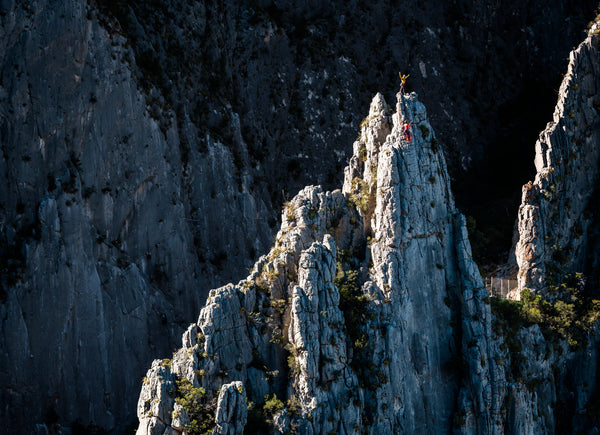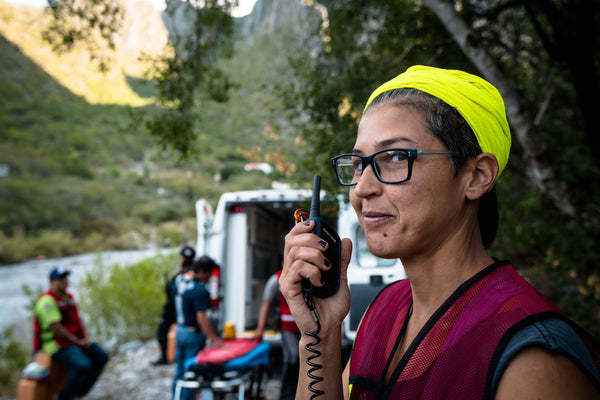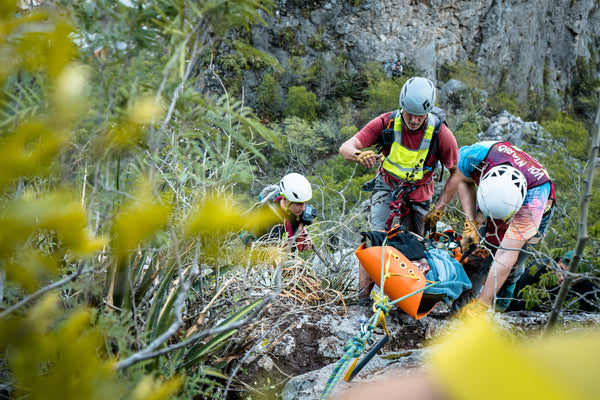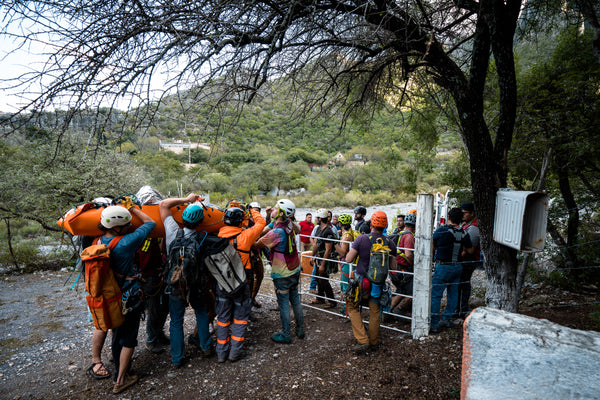The rope hissed as it shot through the anchors, moving at the same speed Kaspar Podgorski was falling, helpless, toward the ground 130 feet below. Panicked, his climbing partner seized the rope. It burned her hands, searing the skin from both palms, but she only tightened her grip as a scream split through the valley below. But it didn’t matter. The rope kept hissing, and Podgorski kept falling.
---
El Portero Chico is like no place else on earth. The park, located just outside Monterrey, Mexico, is a collection of limestone fins, curved and gleaming, stacked like the teeth in a shark’s bottom jaw. Some of them are nearly 2,000 feet high. Better yet, they’re all bolted. Multipitch sport climbing is rare enough in North America. But 20-pitch sport routes with five-minute approaches? The place is a climber’s dream.
That’s exactly the reputation that drew Podgorski, a 33-year-old Virginia-based climber and neuroscientist, to El Portero Chico for a long weekend in January, 2020.

Climbers top out on a ridge in El Portero Chico Park. Photo: Savannah Cummins
He and his longtime climbing partner Kristin landed in Monterrey on the 17th, and woke up early the next day to run up a seven-pitch classic called Off the Couch (5.10d). They topped out around 9:30 AM and started the rappels. Tired and hungry, Podgorski remembers getting more and more comfortable cutting corners to speed things up. On the second-to-last rappel, he tossed the rope without double-checking that the ends were the same length, and started to descend.
On the way down, Podgorski stopped to speak to another climber. By the time he continued rappelling, he was distracted. He was thinking about the climber, about breakfast—everything except the ever-shortening length of rope beneath him.
About 130 feet from the ground, he rappelled off the end of his rope.
---
Rudy Peckham was at home in Hidalgo, Mexico, near the outskirts of the park, when he got the call that a climber had fallen. It sounded bad, he recalls thinking. Really bad.
And Peckham would know—he’s been climbing, guiding, and volunteering on rescues in the area since the 1990s. About four years ago, Rudy Peckham and guide Karla Moya, who's been guiding and volunteering on rescues in Portrero Chico for over 20 years, founded Portrero Chico Rescue. The nonprofit volunteer team now organizes search and rescue missions in the park and provides volunteer training.
For many of those training sessions, the team practices for what they consider the worst case scenario: Someone with a broken femur in a hard-to-reach location.
“This was exactly that, but worse,” Peckham said.
---
As soon as the end of the rope snapped through his rappel device, Podgorski looked down at his hands, surprised. Immediately, he knew exactly what was happening: He’d stopped paying attention, and now he was falling to his death. The last thing he remembers thinking before losing consciousness: This is a very embarrassing way to die.
When Podgorski came to, the skin on his hands and forearms was in tatters. His leg had been shattered. In the seconds he’d been unconscious, he’d started to dream, and upon waking it was at first hard to tell whether the fall had been in his imagination. He couldn’t remember where he was.
Memories trickled back, slowly, reluctantly. The moment of the fall sharpened into focus. So it had been real, he thought.
---
Rudy Peckham grabbed his phone and started mobilizing volunteers. He relayed the message he’d received: A climber had just fallen 50 feet.
Usually, Potrero Chico Rescue works alongside the Protección Civil, the local EMTs, but Protección Civil had gotten a different message—that a climber had fallen 50 meters, which was closer to Podgorski’s estimate of 130 feet.
The EMTs took one look at that number and decided the police should be first on the scene. This wouldn’t be a medical mission, they’d assumed. This would be a body recovery.
Portero Chico Rescue was on their own.

Karla Moya keeps calm and confident as she coordinates operations from the ground. Photo: Savannah Cummins
Volunteers rushed to the scene, quickly dividing into two teams. One would stay to handle things on the ground. A second team would ascend to the fallen climber, then split further as volunteers took their stations belaying and managing the litter. Communication between these teams would be critical.
Peckham geared up for the ascent team. Moya would manage ground operations, radioing medical advice and logistics reports to Peckham’s team via a handful of Rocky Talkies, which had been donated to the crew as part of the company’s ongoing program to support search and rescue teams.
Almost as soon as he started hiking, Peckham realized this rescue would be a fight. The approach was rugged, much of it third- and fourth-class climbing entangled in jungle. It had rained the night before, leaving the trail slick with mud, and the humidity was unbearable. Even if the patient was still alive—which Peckham doubted—it was going to be a hard day.
It took the crew a full hour to reach the base of the cliff. Peckham shouldered his way through the small crowd of climbers, which had gathered to keep an eye on Podgorski and hold his head to stabilize his spine. Peckham was shocked: Against all odds, the patient was alive.
But, while Podgorski didn’t have any obvious head injuries, he did have a broken femur and possible internal bleeding—he was in danger of going into medical shock. Once shock set in, he’d be beyond the volunteers’ aid. To save him, they needed to get him into an ambulance before that happened.
Peckham’s team worked fast. They splinted the leg, stabilized Podgorski’s head, and loaded him into the litter. They lowered it down the steeper slopes via ropes and pulleys, cutting straight across the landscape to save time. About halfway down, they started to lose him.

Rudy Peckham (in the red T-shirt) and Walter Chiarella (in tie-dye) lower Podgorski down steep terrain. Photo: Savannah Cummins.
Peckham had called for a quick water break; his team was flagging in the near 90-degree heat. That’s when he looked over at Podgorski and saw him slipping out of consciousness.
Peckham checked his patient’s vitals. His heart was beating faster than before, but the pulse was getting weak—a sign of shock. Podgorski’s body was shutting down.
The team had already been pushing as hard as they could, and it was impossible to pick up the pace any more. Peckham did the only thing he could. He radioed down the vitals to the ground team, rallied his crew, and kept going.
---
Podgorski doesn’t remember much pain. But he does remember drifting away from lucidness, and how sweet the lure of sleep felt. All he wanted to do was close his eyes.
But another rescuer, Walter Chiarella, wouldn’t let him. The whole way down, he told jokes and riddles, forcing Podgorski to use his brain—forcing him to stay awake.
Later, Peckham said Chiarella’s dogged optimism and constant attention are what stood out to him most about this rescue. His refusal to let Podgorski sleep could have made all the difference.
After five hours of rugged, sweltering descent, the trailhead came into view. By then, Proteccion Civil had met up with the volunteer crew, and they helped load Podgorski into the ambulance before he went into full shock. By then, the EMTs were ready.
“I got super, super lucky,” Podgorski says today. He’s now back to running and climbing, and he recently got engaged. “I have a lot to look forward to—thanks to the Portrero Chico Rescue volunteers,” he says. 
Volunteers carry Podgorski to the waiting ambulance. He has since made a full recovery. Photo: Savannah Cummins




Responses
Leave a comment (all fields required)